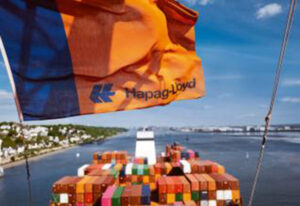Hapag-Lloyd has concluded the first nine months of 2022 with an EBITDA of USD 16.6 billion (EUR 15.6 billion) and an EBIT of USD 15.1 billion (EUR 14.2 billion). At the same time, the Group profit climbed to USD 14.7 billion (EUR 13.8 billion).

“Thanks to higher freight rates, we have achieved an exceptionally strong nine-month result. However, we are also seeing that the market environment has deteriorated further in the third quarter. This is evident, for example, in falling spot rates and rising inflation-related unit costs,” said Rolf Habben Jansen, CEO of Hapag-Lloyd AG.
The first nine months were significantly marked by disruptions in the global supply chains, which resulted in longer turnaround times for ships and containers. At the end of the third quarter, there was weaker demand for container transports and consequently a slight easing in the shortage of available transport capacities.
The transport volumes were on a par with the prior-year level, at 8,987 TTEU (9M 2021: 8,980 TTEU). Revenues increased to USD 28.4 billion (EUR 26.7 billion). This can mainly be attributed to a significant increase in the average freight rate, to 2,938 USD/ TEU (9M 2021: 1,818 USD/ TEU), and a stronger US dollar.
Transport expenses climbed to USD 10.8 billion (EUR 10.1 billion). This was due in part to a significantly higher bunker consumption price, of USD 755 per tonne (9M 2021: USD 452 per tonne), and higher expenses for container handling.
Read Also: Container Shipping Congestion Declines As World Trade Volumes Drop In October
Overall, the strong business performance in the first nine months was in line with the forecast adjusted on 28 July 2022. This also applies to the course of the fourth quarter to date. Thus, for the 2022 financial year, an EBITDA in the range of USD 19.5 to 21.5 billion (EUR 18.2 to 20.1 billion) and an EBIT in the range of USD 17.5 to 19.5 billion (EUR 16.3 to 18.2 billion) are still expected. However, this forecast remains subject to considerable uncertainty given Russia’s war of aggression on Ukraine, supply chain disruptions that have not yet been fully resolved, and the effects of the COVID-19 pandemic.
“In the coming months, the strained situation in the global supply chains should continue to normalise. At the same time, our strong balance sheet will help us to stay on course even in difficult waters. We will stick to our strategic agenda while investing more in quality and growth as well as in the further decarbonisation of our fleet. One very significant focus is investment in infrastructure, which we are using to further expand our terminal portfolio,” Habben Jansen added.
In driving its Strategy 2023, Hapag-Lloyd has continuously expanded its involvement in the terminal sector, most recently through agreements on acquiring stakes in the terminal business of Chile-based SM SAAM and the Italy-based Spinelli Group. In addition, Hapag-Lloyd has stakes in JadeWeserPort in Wilhelmshaven, the Container Terminal Altenwerder in Hamburg, Terminal TC3 in Tangier, and Terminal 2 in Damietta, which is currently under construction.
Kindly like us on Facebook/twitter















